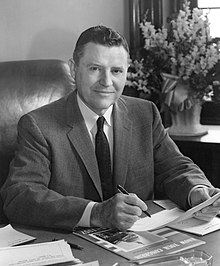Ralph Yarborough | |
|---|---|
 Yarborough in 1957 | |
| United States Senator from Texas | |
| In office April 29, 1957 – January 3, 1971 | |
| Preceded by | William A. Blakley |
| Succeeded by | Lloyd Bentsen |
| Personal details | |
| Born | Ralph Webster Yarborough June 8, 1903 Chandler, Texas, U.S. |
| Died | January 27, 1996 (aged 92) Austin, Texas, U.S. |
| Political party | Democratic |
| Spouse |
Opal Warren (m. 1928) |
| Children | 1 |
| Education | Sam Houston State Teachers College University of Texas at Austin (LLB)[1] |
| Military service | |
| Allegiance | |
| Branch/service | |
| Years of service | 1923–1926 (NG) 1943–1946 (Army) |
| Rank | Staff Sergeant (NG) Lieutenant colonel (Army) |
| Unit | 36th Infantry Division |
| Battles/wars | World War II |
Ralph Webster Yarborough (June 8, 1903 – January 27, 1996) was an American politician and lawyer. He was a Texas Democratic politician who served in the United States Senate from 1957 to 1971 and was a leader of the progressive wing of his party. Along with Senate Majority Leader Lyndon B. Johnson and Speaker of the House Sam Rayburn, but unlike most Southern congressmen, Yarborough refused to support the 1956 Southern Manifesto, which called for resistance to the racial integration of schools and other public places. Yarborough voted in favor of the Civil Rights Acts of 1957,[2] 1960,[3] 1964,[4] and 1968,[5] as well as the 24th Amendment to the U.S. Constitution,[6] the Voting Rights Act of 1965,[7] and the confirmation of Thurgood Marshall to the U.S. Supreme Court.[8] Yarborough was the only senator from a state that was part of the Confederacy to vote for all five bills.[9]
Born in Chandler, Texas, Yarborough practiced law in El Paso after graduating from the University of Texas School of Law. He became an assistant to Texas Attorney General James Burr V Allred in 1931 and specialized in prosecuting major oil companies. Allred was later elected governor of Texas and appointed Yarborough to a judgeship in Travis County. After serving in the United States Army during World War II, Yarborough repeatedly ran for governor, opposing the conservative faction of Democrats led by Allan Shivers. Price Daniel resigned from the Senate after winning the 1956 gubernatorial election, and Yarborough won the special election to serve the remainder of Daniel's term. He won election to a full term in 1958 and was reelected again in 1964, defeating Harris County Republican Party Chairman George H. W. Bush in the latter race.
Yarborough was known as "Smilin' Ralph" and used the slogan "Let's put the jam on the lower shelf so the little people can reach it" in his campaigns. He staunchly supported the "Great Society" legislation that encompassed Medicare and Medicaid, the War on Poverty, federal support for higher education and veterans, and other programs. He also co-wrote the Endangered Species Act and was the most powerful proponent of the Big Thicket National Preserve.[10] Yarborough criticized the Vietnam War and supported Robert F. Kennedy in the 1968 presidential election until the latter's assassination.
In 1970, Yarborough lost re-nomination to fellow Democrat Lloyd Bentsen, who campaigned as relatively more conservative. Yarborough attempted to win the 1972 Democratic primary for Texas's other Senate seat, but lost the primary to Barefoot Sanders. Yarborough did not seek public office after 1972.
- ^ Official congressional directory. 91st congress 2nd session 1970
- ^ "HR. 6127. Civil Rights Act of 1957". GovTrack.us.
- ^ "HR. 8601. Passage of Amended Bill".
- ^ "HR. 7152. Passage".
- ^ "To Pass H.R. 2516, A Bill to Prohibit Discrimination in Sale or Rental of Housing, and to Prohibit Racially Motivated Interference with a Person Exercising His Civil Rights, and for Other Purposes".
- ^ "S.J. Res. 29. Approval of Resolution Banning the Poll Tax as Prerequisite for Voting in Federal Elections". GovTrack.us.
- ^ "To Pass S. 1564, The Voting Rights Act of 1965".
- ^ "Confirmation of Nomination of Thurgood Marshall, The First Negro Appointed to the Supreme Court". GovTrack.us.
- ^ Labaton, Stephen (January 28, 1996). "Ralph Yarborough Dies at 92; Cast Historic Civil Rights Vote". The New York Times. Retrieved August 2, 2012.
- ^ Abernethy, Francis E.: Big Thicket from the Handbook of Texas Online. Retrieved August 24, 2012. Texas State Historical Association